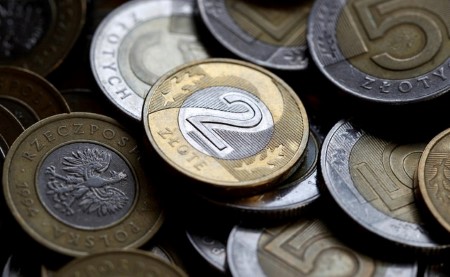




Policy Rate Updates: BSP outlook — cloudy with a chance of rate cut
 DOWNLOAD
DOWNLOAD

January Economic Update: Growth slows, prices rise
 DOWNLOAD
DOWNLOAD

Inflation Update: Up, up, and away?
 DOWNLOAD
DOWNLOAD


Signs of slowing growth weigh on CEE currencies

Aug 17 (Reuters) – Signs of slowing economic growth weighed on central and eastern European currencies and stocks on Wednesday, while emerging market stocks hovered at seven-week highs as investors awaited minutes of the US Federal Reserve’s last meeting.
Hungary’s forint dropped for a third straight session, down 0.9% against the euro, while the zloty fell 0.7%, on course for its worst session in three weeks.
The Romanian leu inched lower after marking its worst session in 3-1/2 years on Tuesday.
Data on Wednesday showed Romania’s second quarter GDP growth beat expectations, while Hungarian economic growth slowed on a quarter-on-quarter basis. Polish GDP came in much lower than expected.
A slowdown in domestic demand, rising interest rates, government spending cuts and companies’ surging costs amid double-digit inflation are dampening growth in the central and eastern Europe, economists say.
“There is a real risk that some EMs might experience an H2 growth cliff – we were alarmed by a sharp drop in July’s activity surveys in Poland, the Czech Republic, and Mexico,” said Natalia Gurushina, chief economist, EM fixed income at VanEck.
More broadly, sentiment was cautious ahead of Fed minutes due at 1800 GMT. Bets for a third consecutive 75 basis points rate hike had come down after data last week showed softer-than-expected US inflation growth. But odds are now more or less split between a 50 bps and 75 bps hike.
Emerging market stocks were up 0.2%, with gains capped by losses in central and eastern Europe.
Against a steady dollar, South Africa’s rand slipped 0.5% ahead of local retail sales data for June, which is seen having grown at a significantly slower pace month-on-month.
Turkey’s lira was flat against the dollar, less than 2.5% away from record lows, with investors expecting the central bank to hold its key interest rate steady at 14% again at Thursday’s meeting, despite inflation surging to almost 80%.
A report of Ankara signing a contract for more Russian S-400 defence systems raised worries about frayed ties with NATO allies. The United States impose sanctions on Turkey after its initial 2020 purchase of the S-400 system.
Kenyan government bonds gave back some of Tuesday’s recovery as the country braced for a legal battle over the presidential election victory awarded to current deputy president William Ruto.
Israel’s shekel currency extended gains against the greenback, inching closer to four-month highs, after a sharp rebound in the country’s economic activity and a jump in annual inflation made a 75 bps interest rate increase more likely next week.
(Reporting by Susan Mathew in Bengaluru; Editing by Mark Potter)
This article originally appeared on reuters.com





 By Reuters
By Reuters